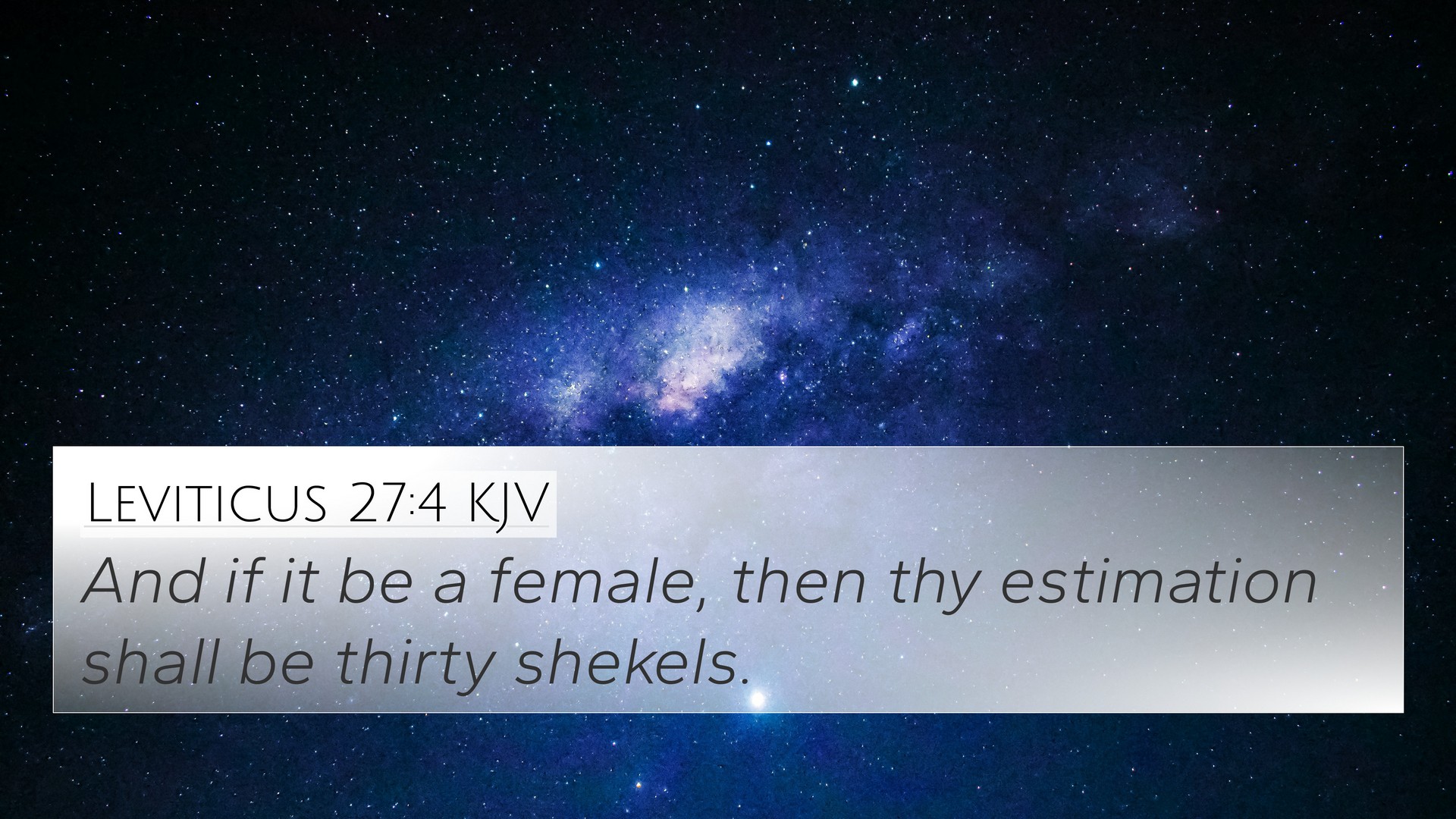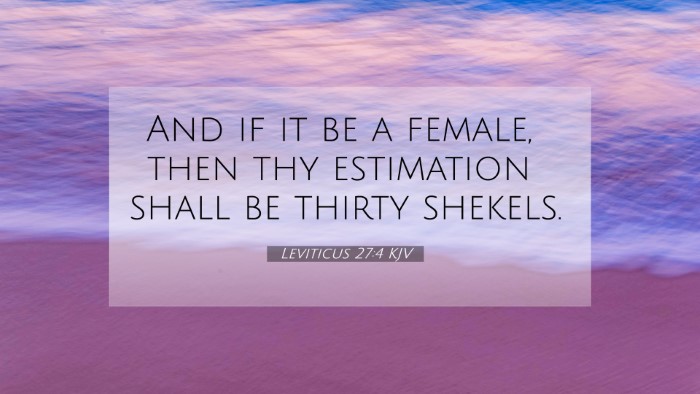Meaning and Interpretation of Leviticus 27:4
Leviticus 27:4 states: "And if it be a female from twenty years old even unto sixty years old, then thy estimation shall be thirty shekels." This verse is part of a legislation relating to vows and the valuation of persons dedicated to the Lord. It touches on the theme of dedication and the significance placed on different individuals based on their age and gender.
Contextual Overview
The book of Leviticus primarily offers instructions about holiness, sacrifice, and offerings pertinent to the Israelites. Chapter 27 specifically addresses the regulations for vows and dedications, wherein people could dedicate themselves or their possessions to the Lord, often involving a monetary value.
Insights from Commentaries
In examining Leviticus 27:4, several prominent public domain commentaries provide rich insights into its meaning:
-
Matthew Henry:
Henry emphasizes the importance of value placed on individuals when dedicated to God. The valuation, influenced by factors such as age and gender, reflects societal norms while also communicating that every individual has a worth in God’s service.
-
Albert Barnes:
Barnes notes that the valuation system provided was rooted in the cultural context of Israel. He draws attention to the fact that thirty shekels were the price of a female slave, symbolizing insight into the worth of a woman in that society, yet starkly reminding readers of the repercussions it has in today’s discussions on women's value.
-
Adam Clarke:
Clarke discusses the valuation in economic terms, suggesting it modeled the sacrifices made in offerings to the Lord. He indicates this reflects a broader theological point regarding incurring costs in the service of holiness and commitment to God.
Significance of Female Valuation
The valuation of thirty shekels for females signifies a cultural understanding of worth that may challenge modern interpretations. The connections here foster discussions around societal roles, the interpretation of scripture in context, and an understanding of gender equity as framed within biblical texts.
Related Cross References
Understanding Leviticus 27:4 benefits from linking to various cross-references throughout the Bible, providing a richer theological and historical context:
- Exodus 21:32: Discusses the value placed on slaves, reinforcing societal norms around valuation.
- Matthew 26:15: References the thirty pieces of silver, connecting themes of valuation and betrayal.
- 1 Timothy 2:9-10: Talks about women's appearance and worth in the context of godliness, potentially reflecting back on how women are regarded in society.
- Genesis 30:20: Relates to Rachel valuing her maid, illustrating the dynamics of female relationships and societal roles.
- Proverbs 31:10: Exemplifies the worth of a virtuous woman, contrasting cultural values with inherent worth in virtue.
- Galatians 3:28: Emphasizes equality in Christ, suggesting an important theological shift regarding gender and worth.
- Luke 8:3: Mentions women who served Jesus and highlights the significance of women in ministry.
- Acts 2:17-18: Prophesies about gender inclusivity in the Spirit's outpouring, reinforcing positive valuation.
- Galatians 2:20: Focused on personal value and identity in Christ, reinforcing the theme of inherent worth regardless of societal valuation.
- Ephesians 2:10: Reiterates that all are God's masterpiece, contrasting valuations based on earthly standards.
Thematic Connections
The thematic implications stemming from Leviticus 27:4 extend into modern applications regarding equality and justice, identity in Christ, and the evolving understanding of gender roles with biblical narratives. Such cross-references serve as tools for a comprehensive Bible study, illustrating the necessity of interpreting scripture in light of the whole counsel of God.
Conclusion
In summary, Leviticus 27:4 presents a complex interplay of value, dedication, and societal norms that calls for careful interpretation and application. By utilizing cross-references and insights from various scholars, readers can develop a deeper understanding of how this verse fits into the broader narrative of the Bible, reinforcing the significance of thematic connections within scripture.
Tools for Further Study
For those interested in exploring the connections between Bible verses further, tools such as a Bible concordance or a cross-reference guide can be extremely helpful. Utilizing these resources can illuminate the layered meanings within scripture, enhance understanding of biblical themes, and support in sermon preparation or personal study.
Final Thoughts
Reflecting on Leviticus 27:4 and its cross-references encourages not only academic reflection but also vibrant dialogues about faith, equality, and our understanding of how God values each individual.





